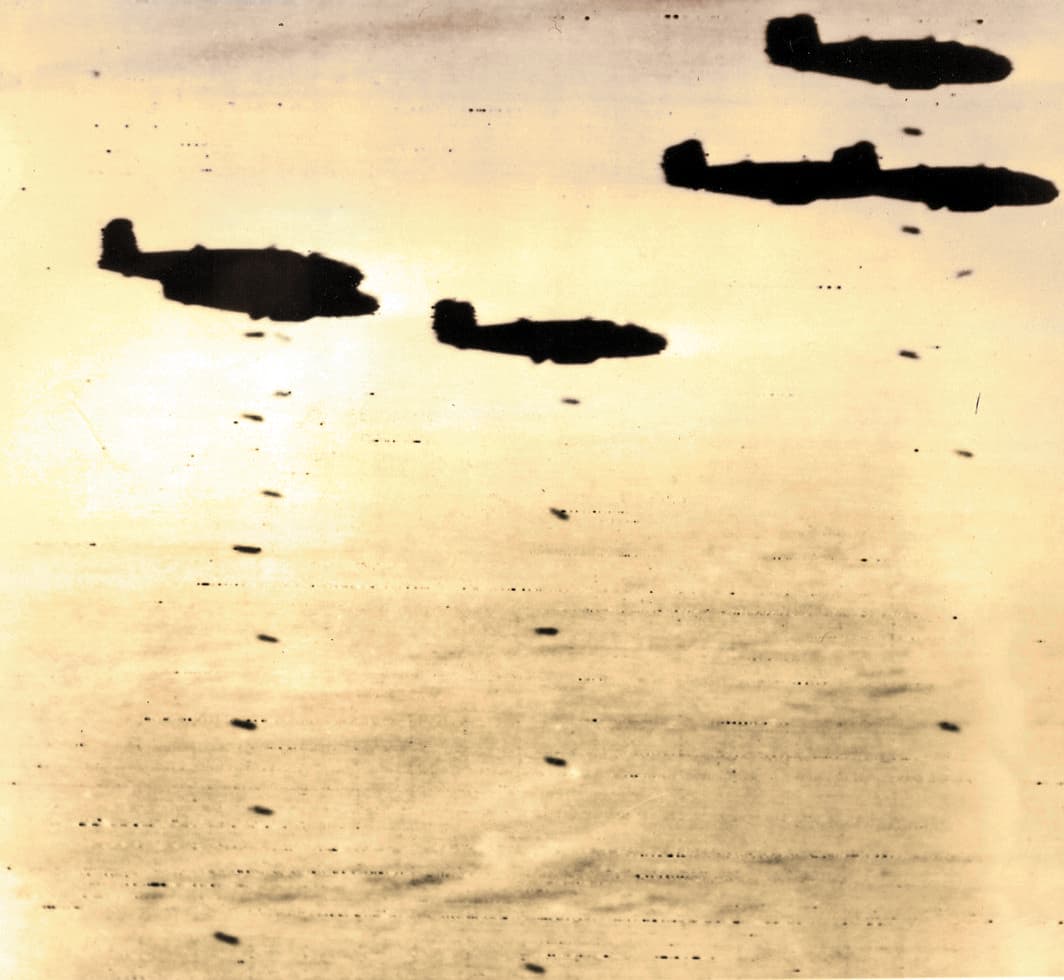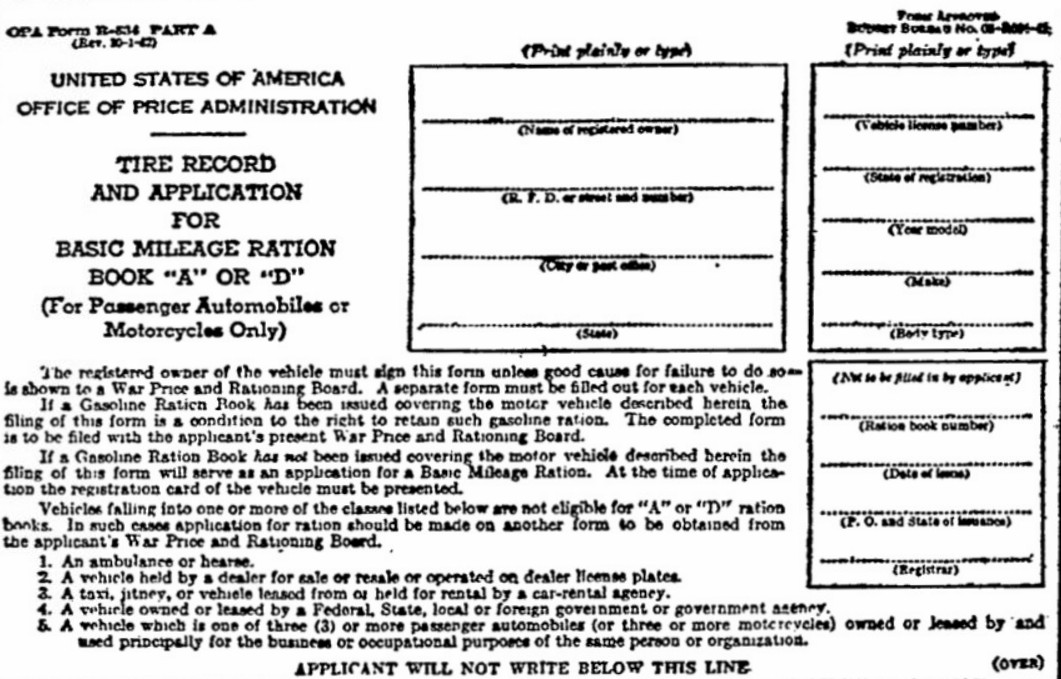Biggest armored clash so far –
Axis tanks smashed back as British gain in Egypt
Allied fliers hammer Rommel’s forces as both sides jockey for big blow; Infantry mops up wedges
By Leon Kay, United Press staff writer

A silhouette in death and destruction is this remarkable picture of a formation of American-built B-25 bombers “laying their eggs” on the enemy in the African desert. Note the bombs gently nosing over on their deadly earthward errands.
Cairo, Egypt –
American and British planes struck continuously at Axis concentrations in the forward desert area today after Marshal Erwin Rommel’s tank forces had been thrown back in the most severe armored clash yet fought in the British Eighth Army’s new offensive.
German and Italian concentrations of trucks, troops and tanks were reported to be under severe punishment as Allied air supremacy in the battle area was pressed to the limit to smash Rommel’s forces before they could reorganize for counterattacks.
Other air squadrons raged over the Mediterranean, blasting at Axis attempts to rush reinforcements to the North African battle scene.
U.S. fliers score again
American planes shot down four more Messerschmitt Me 109 fighters in yesterday’s battles as the enemy tried to avoid combat all day, the U.S. Army reported.
In all, 10 planes were shot down by the Allied air forces, bringing the total for three days to 43.
Another Axis tanker heading for Tobruk was reported sunk, bringing the total of Axis supply ships destroyed in five days to five, including three tankers.
The fact that the five ships were heading for Tobruk when sunk was regarded as most significant since it indicates the enemy urgently needs fuel and other supplies for the current battle. Otherwise, the Axis would not risk exposing its shipping within easy range of Allied bombers. It is much safer, from the Axis viewpoint, to ship to Benghazi and bring up the supplies overland – but it is also considerably slower.
Brisk fighting was in progress in Rommel’s forward lines where British infantrymen were picking their way through a maze of mines and fortifications.
Both sides are cautious
An enemy counterattack was beaten off Tuesday night, the communiqué said, and yesterday further tank engagements developed, resulting in new losses for the Axis forces which had been hurled back in the first armored clash of the campaign Tuesday.
Lt. Gen. B. L. Montgomery’s polyglot British Army was inching forward carefully, feeling out its ground before permitting the new Battle of Egypt to develop into the expected all-out fight.
Both sides were exhibiting more than normal caution.
The British attacks in the north and center of the Alamein Line appeared to have made a promising start. Only in the south, toward the impassable Qattara salt bog, had it faltered. The exceptional resistance the British were meeting in the south was regarded here as a major reason why the general plan of attack was not developing more rapidly.
Torpedo planes attack
Allied aircraft were still leading the attack, battering Axis landing grounds and forward positions. Today’s communiqué reported that nine more of Rommel’s planes had been shot down against British losses, including operations over the Mediterranean island of Malta, of only four planes.
Tuesday night, Allied heavy bombers raided airfields on Crete, from which Axis troops have been sent to North Africa in big aerial transports.
Last night, Allied torpedo-carrying planes attacked a large enemy tanker bound for the African coast and sank it.
Desert dispatches said that although the tank engagement did not develop into an all-out battle, it was fiercely fought and was an indication that the second phase of the offensive was opening.
The tank skirmish demonstrated that the breaks in Rommel’s maze of minefields, barbed wire and gun positions had become deep and wide enough to permit a limited amount of tank maneuvering.
Indications were that the main weight of the British attack was being delivered against the coastal section of the Alamein Line.
Strong Allied air forces, controlling the skies, were delivering paralyzing punches at Rommel’s forces. Fliers of the U.S. Air Force, who shot down seven planes in Tuesday’s widespread air activity, were again in the vanguard.
U.S. forces struck heavily through the air all through yesterday, shooting down seven planes, three of which were downed by Lt. Lyman L. Middleditch, of Union, New Jersey.
Many hits observed
An American communiqué said:
The Desert Air Task Force of the U.S. Army Middle East Air Force continued relentless attacks. In a series of combined operations with Allied light bombers, our medium bombardment aircraft bombed the enemy landing grounds, motor convoys, tanks, concentrations and the Matruh dock area. Many hits were observed.
Our fighters, flying patrol bomber escort with fighter-bomber missions, encountered fairly heavy enemy air oppositions. Three Me 109s and four CR.42 Italian fighters were shot down.
Lt. Middleditch, who was already credited with an Me 109 shot down Oct. 25, bagged his three planes in an engagement which started over Fuka, about midway between Daba and Matruh.
Outnumbered 4 to 1
American bombers, escorted by American and Australian fighters, encountered a formation of planes consisting of 20 Junkers Ju 87s, 20 CR.42s and 20 Me 109s. The American formation was outnumbered four to one.
Lt. Middleditch, flying high, opened fire immediately and shot down one Me 109. Three others got on his tail at once. He shook them off and, with guns blazing, got his second plane. With only two planes to deal with, Lt. Middleditch found himself over the sea.
He outmaneuvered the Germans, shot down his third plane and then, his ammunition exhausted, made for home.


